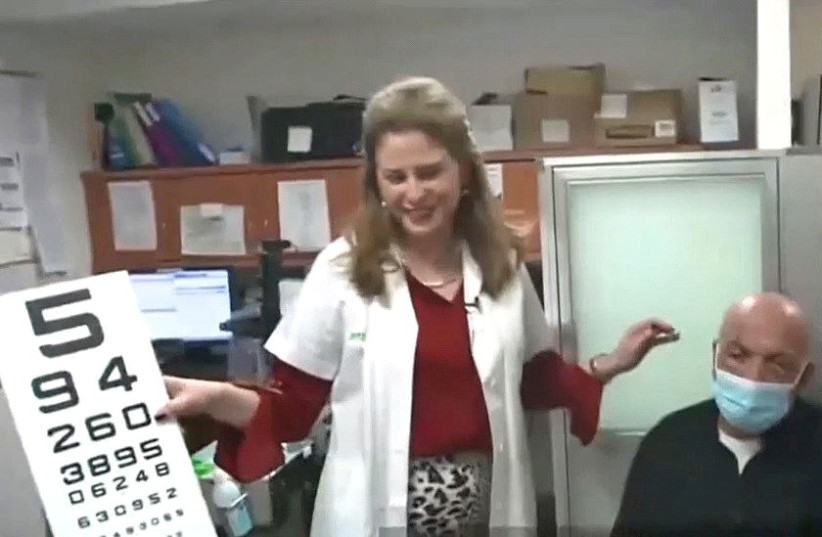PARIS – Angel or accelerator? French software corporation Dassault Systèmes is using its tech, power and cold hard cash to propel start-ups – including from Israel – into the big leagues.
Dassault Systèmes develops software for 3D product designs, simulations and helps small companies take their products to market. Founded in 1981 and headquartered in a suburb of Paris, this 20,000-person company has employees in 140 countries and is developing technology even more.
That includes one special Israeli tech company called CorNeat, which was highlighted by Dassault Systèmes and is now accelerating through clinical trials thanks to the 3DEXPERIENCE Lab accelerator program. The program helps companies under five years old boost their business with solutions and support.
The accelerator program offers up to five years of 3D experiences where companies can test their products easily and cheaply using 3D models and other types of simulations. Dassault Systèmes also provides and pays for cloud resources, which is a big expense for companies that need to pay to store their data.
The program helps connect start-ups to tools they might need for product development as well as offer full support with a dedicated contact person within the company.

At Dassault Systèmes, any and all employees are expected and encouraged to allocate 10% of their working hours to companies in the accelerator program, even though they may be working on items in completely different departments. Start-ups like CorNeat have certainly not forgotten about that part of the package.
“Their team helped us deal with collecting data for our clinical trials,” said CorNeat co-founder and CEO Almog Aley-Raz during an interview.
Aley-Raz and his team are in the business of creating artificial corneas that integrate with the natural eye permanently. The man-made cornea is one of the first to permanently live with resident ocular tissue and replace deformed or diseased corneas. After the implant is in, the cornea regains sight without pain or discomfort. This is not an easy feat.
“The material we use and develop and optimize is very, very unique as it is the only material that embeds itself with tissue for life without inflammatory response,” explained CorNeat co-founder Dr. Gilad Litvin, who serves as the company’s chief medical officer. “Every implant you put into the body triggers a complex process, and our body will try to push it out, and if it can’t, it will eventually get covered with a fibrous layer. Our material does not get encapsulated.”
“Every implant you put into the body triggers a complex process, and our body will try to push it out, and if it can’t, it will eventually get covered with a fibrous layer. Our material does not get encapsulated.”
Dr. Gilad Litvin
The company’s first implant took place 22 months ago with the help of Dassault Systèmes. Running companies through clinical trials for FDA approval is one of the resources Dassault Systèmes offers. For CorNeat, it’s heaven-sent.
Every company has different needs
“Every company has different needs,” said Aley-Raz. “Our engineering team is using this platform and it includes design software and simulation software and change control... it’s a lot of elements that ease our work and help us out. Moreover, Dassault Systèmes is the owner of Medidata, which is a clinical management platform.”
Aley-Raz noted the importance of guidance through clinical trials. For so many companies, this is the most difficult part. Creating products for testing purposes can take a long time and cost an arm and a leg. For making iterations on the eye transplant, the founders of CorNeat say using the 3D platform is a big time-saver. But, there’s something that technology still can’t beat.
“Their team helped us deal with collecting data for our clinical trials,” said Aley-Raz. “These are the areas where we leverage, and, of course, exposure! There’s the marketing team that helps us propagate the system. We need exposure to investors and key opinion leaders… Dassault Systèmes is great.”
Frederic Vacher is the founder of the 3DExperience Lab and current head of innovation. Vacher created the lab six years ago and is monitoring the UN Sustainable Development Goals to find the best projects that give a real impact.
Vacher is only working on what he calls “disruptive projects” because he wants to look at the world with “fresh eyes” and help companies scale in order to answer the big challenges we face as a society including well-being, energy, mobility and pollution – to name a handful.
“It’s really ambitious. We are creating a global network. We are inclusive, so we will not solve all the challenges alone. No one will. So working with collective intelligence, in collaboration with start-ups, with passionate people, with research labs... we can find solutions,” Vacher said.
Vacher spoke about the importance of mentoring, saying giving free software is great, but offering mentors to emerging companies is even better. The mentors are real, but they work with people around the globe using online tools like video chat or e-mail.
The 3DExperience lab exists in Paris, Boston, India and Munich, which was recently opened. Dassault Systèmes expects to open another lab in Shanghai and then, they say, they can service almost the entire world.
The writer was a guest of Dassault Systèmes.
